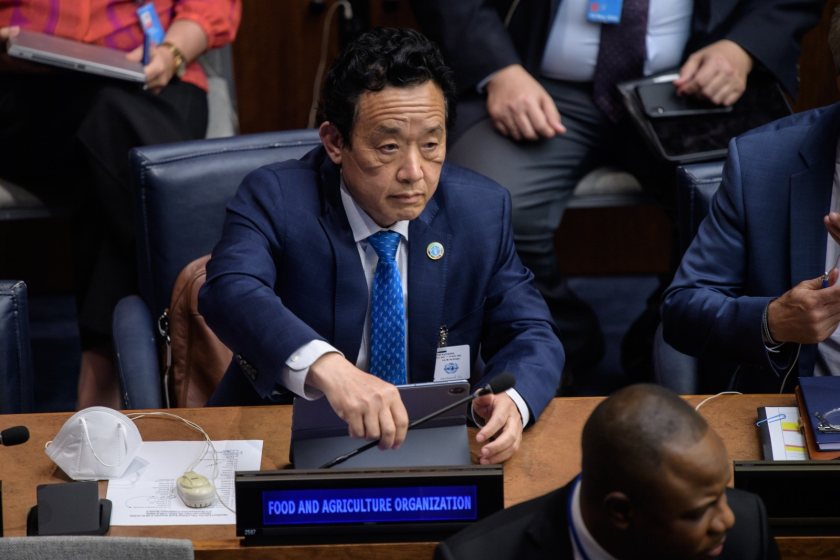UN calls for 'transformation' of agriculture amid fears of global food crisis

The UN has called for a 'transformation' of agriculture to make it more resilient to shocks amid fears the Ukraine war could soon cause a global food crisis.
The Director-General of the Food and Agriculture Organization (FAO), Qu Dongyu, made the urgent call at a UN meeting in New York on Wednesday (18 May).
Together, Russia and Ukraine produce 30 percent of the global wheat supply, and Ukraine in particular is seen as the world's bread basket.
But since the start of Russia's invasion in February, exports have collapsed and prices have surged. This led India to recently ban its own wheat exports.
This crisis, along with the pandemic and the effects of climate change, have increased people’s vulnerability and pushed hundreds of millions of more people to the brink of hunger, Mr Dongyu said.
According to the Global Report on Food Crisis released earlier this month, in 2021 193 million people were acutely food insecure and in need of urgent assistance across 53 countries.
Malnutrition rates have also increased, with millions of children suffering from stunting or wasting whereas a healthy diet is out of reach for 3 billion people.
Moreover, the budgets of governments and consumers have been squeezed tighter and countries’ income per capita has shrunk, creating a cumulative loss to the global economy of more than $12 trillion over 2020-21, Mr Dongyu said.
Noting that in March 2022 the FAO Food Price Index reached its highest level since its inception in 1990, he warned about the 'cascading impact' of the war in Ukraine that could further exacerbate global food prices.
Additionally, Russia is one of the top exporters in the world of fertilisers, he added, pointing out that the next planting season of countries which are import dependent on Russia could be at risk.
"Time is short, and the situation is dire,” the Director-General said, adding there needed to be a "transformation of agrifood systems to be more efficient, inclusive, resilient and sustainable."
"First, we must scale up emergency agricultural assistance. Currently only 8% of all food security funding in emergencies goes to assist agricultural production,” he noted.
He emphasised that investing in agriculture and rural livelihoods was strategic, and 7 to 10 times more cost-effective than traditional assistance.
"Second, it is vital to invest in agrifood systems as well as hard infrastructure - roads, irrigation, electrification, and digital - and value chain infrastructure - storage facilities, cooling facilities, banking infrastructure and insurance infrastructure.
"Growth in the agriculture sector is a sure-fire way to cut poverty and hunger in many middle- to low-income countries," the Director-General said.
Third, science and innovation must be prioritised to revamp agrifood systems, he told the meeting in New York.
He highlighted the role of cutting-edge innovations in agriculture, such as new breeding techniques to boost crop yields, desired traits, and climate resilience.
And digital agriculture could significantly reduce market failures in agriculture and improve the functioning of the agricultural markets.
Fourth, Mr Dongyu urged countries to reduce food loss and waste. Currently, the high amounts of food loss and waste could feed around 1.26 billion people per year, he said.
“If we reduce food loss and waste by 50%, there would be sufficient fruits and vegetables available in the food supply to cover the recommended amount of fruits and vegetables per person per day,” he added.
UN Secretary-General Antonio Guterres also warned on Wednesday that the Ukraine war "threatens to tip tens of millions of people over the edge into food insecurity followed by malnutrition, mass hunger and famine".
Mr Guterres said he was in "intense contact" with both Ukraine and Russia, as well as the European Union and United States, to help restore food exports to pre-war levels.
"There is enough food in our world now if we act together. But unless we solve this problem today, we face the spectre of global food shortage in the coming months," he said.








